Nursing nsg5003 week 6 - Study guides, Class notes & Summaries
Looking for the best study guides, study notes and summaries about Nursing nsg5003 week 6? On this page you'll find 44 study documents about Nursing nsg5003 week 6.
All 44 results
Sort by
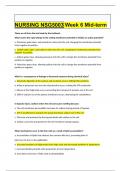
-
NURSING NSG5003 Week 6 Mid-term
- Exam (elaborations) • 10 pages • 2024
-
Available in package deal
-
- $7.99
- + learn more
NURSING NSG5003 Week 6 Mid-term Why does tissue damage occurs in acute rejection after organ transplantation? a. Th1 cells release cytokines that activate infiltrating macrophages, and cytotoxic T cells directly attack the endothelial cells of the transplanted tissue. b. Circulating immune complexes are deposited in the endothelial cells of transplanted tissue, where the complement cascade lyses tissue. c. Receptors on natural killer cells recognize antigens on the cell surface of transplan...
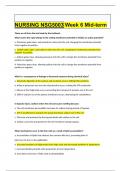
-
NURSING NSG5003 Week 6 Mid-term
- Exam (elaborations) • 10 pages • 2024
-
- $12.49
- + learn more
NURSING NSG5003 Week 6 Mid-term These are all from the test bank for the textbook. What causes the rapid change in the resting membrane potential to initiate an action potential? a. Potassium gates open, and potassium rushes into the cell, changing the membrane potential from negative to positive. b. Sodium gates open, and sodium rushes into the cell, changing the membrane potential from negative to positive. c. Sodium gates close, allowing potassium into the cell to change the membrane...
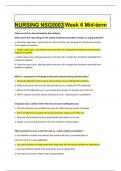
-
NURSING NSG5003 Week 6 Mid-term
- Exam (elaborations) • 10 pages • 2023
- Available in package deal
-
- $13.99
- + learn more
NURSING NSG5003 Week 6 Mid-term These are all from the test bank for the textbook. What causes the rapid change in the resting membrane potential to initiate an action potential? a. Potassium gates open, and potassium rushes into the cell, changing the membrane potential from negative to positive. b. Sodium gates open, and sodium rushes into the cell, changing the membrane potential from negative to positive. c. Sodium gates close, allowing potassium into the cell to change the membrane...
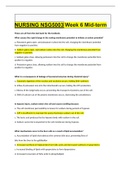
-
NURSING NSG5003 Week 6 Mid-term
- Exam (elaborations) • 10 pages • 2023
-
Available in package deal
-
- $8.69
- + learn more
NURSING NSG5003 Week 6 Mid-term These are all from the test bank for the textbook. What causes the rapid change in the resting membrane potential to initiate an action potential? a. Potassium gates open, and potassium rushes into the cell, changing the membrane potential from negative to positive. b. Sodium gates open, and sodium rushes into the cell, changing the membrane potential from negative to positive. c. Sodium gates close, allowing potassium into the cell to change the membrane...
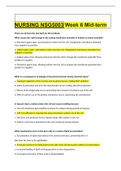
-
NURSING NSG5003 Week 6 Mid-term.
- Exam (elaborations) • 10 pages • 2022
-
- $13.49
- + learn more
NURSING NSG5003 WEEK 6 MID-TERM These are all from the test bank for the textbook. What causes the rapid change in the resting membrane potential to initiate an action potential? a. Potassium gates open, and potassium rushes into the cell, changing the membrane potential from negative to positive. b. Sodium gates open, and sodium rushes into the cell, changing the membrane potential from negative to positive. c. Sodium gates close, allowing potassium into the cell to change the membrane...
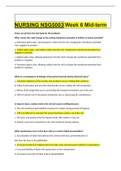
-
Exam (elaborations) NURSING NSG5003 Week 6 Mid-term.
- Exam (elaborations) • 10 pages • 2022
-
- $13.99
- + learn more
NURSING NSG5003 Week 6 Mid-term These are all from the test bank for the textbook. What causes the rapid change in the resting membrane potential to initiate an action potential? a. Potassium gates open, and potassium rushes into the cell, changing the membrane potential from negative to positive. b. Sodium gates open, and sodium rushes into the cell, changing the membrane potential from negative to positive. c. Sodium gates close, allowing potassium into the cell to change ...
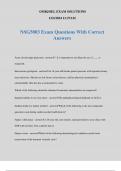
-
NSG5003 Exam Questions With Correct Answers
- Exam (elaborations) • 34 pages • 2024
-
- $11.49
- + learn more
NSG5003 Exam Questions With Correct Answers Acute closed-angle glaucoma - answer1. It is important to not dilate the eye if ____ is suspected. Intravenous pyelogram - answerAn 18-year-old female patient presents with repeated urinary tract infections. She has no risk factors in her history, and her physical examination is unremarkable. She also has a normal pelvic exam. Which of the following should be obtained if anatomic abnormalities are suspected? Impaired ability to use iron stores ...
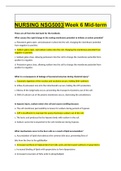
-
NURSING NSG5003 Week 6 Mid-term| 2022 UPDATE
- Exam (elaborations) • 10 pages • 2022
- Available in package deal
-
- $11.99
- + learn more
NURSING NSG5003 Week 6 Mid-term These are all from the test bank for the textbook. What causes the rapid change in the resting membrane potential to initiate an action potential? a. Potassium gates open, and potassium rushes into the cell, changing the membrane potential from negative to positive. b. Sodium gates open, and sodium rushes into the cell, changing the membrane potential from negative to positive. c. Sodium gates close, allowing potassium into the cell to change the membrane...
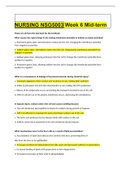
-
NURSING NSG5003 Week 6 Mid-term
- Exam (elaborations) • 10 pages • 2022
-
- $15.49
- + learn more
NURSING NSG5003 Week 6 Mid-term These are all from the test bank for the textbook. What causes the rapid change in the resting membrane potential to initiate an action potential? a. Potassium gates open, and potassium rushes into the cell, changing the membrane potential from negative to positive. b. Sodium gates open, and sodium rushes into the cell, changing the membrane potential from negative to positive. c. Sodium gates close, allowing potassium into the cell to change the membrane...
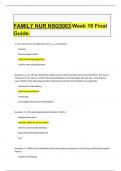
-
FAMILY NUR NSG5003 Week 10 Final Guide.
- Exam (elaborations) • 55 pages • 2024
-
- $14.49
- + learn more
FAMILY NUR NSG5003 Week 10 Final Guide. 1. It is important to not dilate the eye if is suspected. Cataract Macular degeneration Acute closed-angle glaucoma Chronic open-angle glaucoma Question 2. 2. An 18-year-old female patient presents with repeated urinary tract infections. She has no risk factors in her history, and her physical examination is unremarkable. She also has a normal pelvic exam. Which of the following should be obtained if anatomic abnormalities are suspected? Ult...

Did you know that on average a seller on Stuvia earns $82 per month selling study resources? Hmm, hint, hint. Discover all about earning on Stuvia


